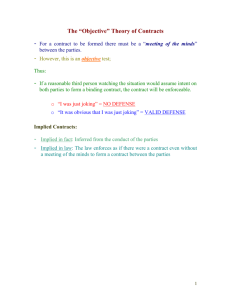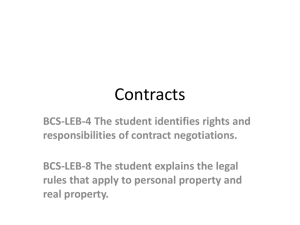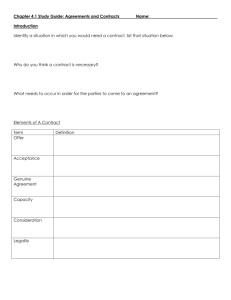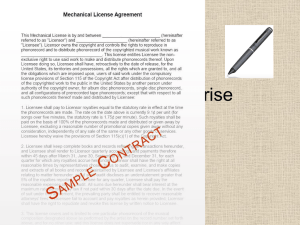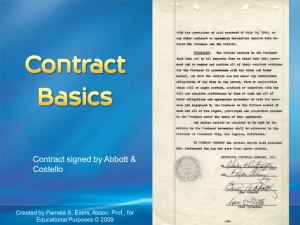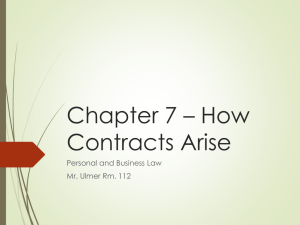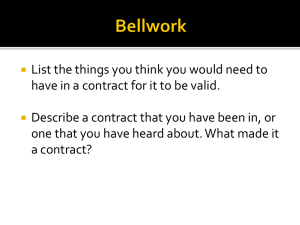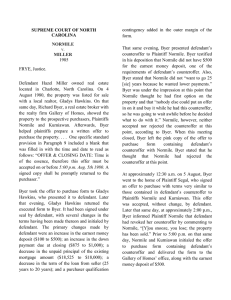English - Olivia L. Blessing Business Law
advertisement
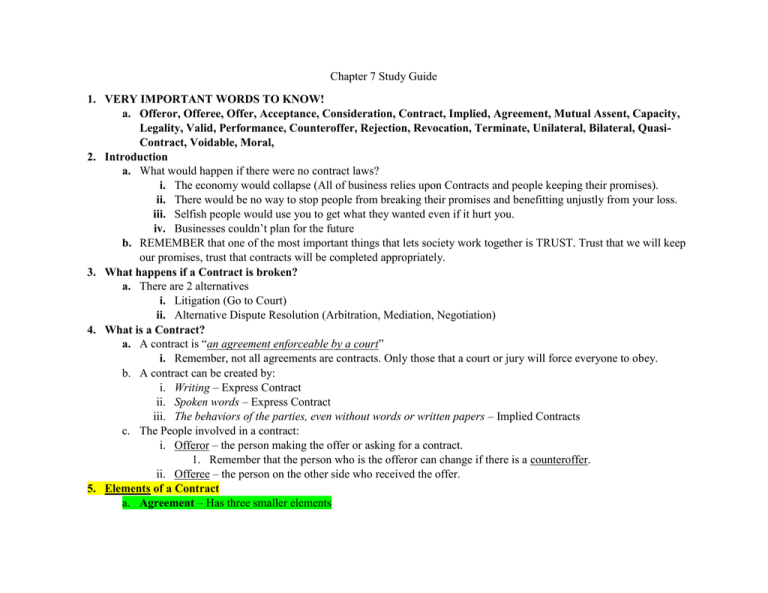
Chapter 7 Study Guide 1. VERY IMPORTANT WORDS TO KNOW! a. Offeror, Offeree, Offer, Acceptance, Consideration, Contract, Implied, Agreement, Mutual Assent, Capacity, Legality, Valid, Performance, Counteroffer, Rejection, Revocation, Terminate, Unilateral, Bilateral, QuasiContract, Voidable, Moral, 2. Introduction a. What would happen if there were no contract laws? i. The economy would collapse (All of business relies upon Contracts and people keeping their promises). ii. There would be no way to stop people from breaking their promises and benefitting unjustly from your loss. iii. Selfish people would use you to get what they wanted even if it hurt you. iv. Businesses couldn’t plan for the future b. REMEMBER that one of the most important things that lets society work together is TRUST. Trust that we will keep our promises, trust that contracts will be completed appropriately. 3. What happens if a Contract is broken? a. There are 2 alternatives i. Litigation (Go to Court) ii. Alternative Dispute Resolution (Arbitration, Mediation, Negotiation) 4. What is a Contract? a. A contract is “an agreement enforceable by a court” i. Remember, not all agreements are contracts. Only those that a court or jury will force everyone to obey. b. A contract can be created by: i. Writing – Express Contract ii. Spoken words – Express Contract iii. The behaviors of the parties, even without words or written papers – Implied Contracts c. The People involved in a contract: i. Offeror – the person making the offer or asking for a contract. 1. Remember that the person who is the offeror can change if there is a counteroffer. ii. Offeree – the person on the other side who received the offer. 5. Elements of a Contract a. Agreement – Has three smaller elements i. Offer ii. Acceptance iii. Mutual Assent b. Consideration c. Capacity d. Legality 6. Agreement (Offer + Acceptance + Mutual Assent) a. Offer i. Definition~ An offer volunteers to do an exchange. ii. There are four elements or terms required for a valid offer. (Remember the 4 P’s) 1. Parties (who am I offering this to?) 2. Product (What is being offered?) 3. Price (what will it cost you?) 4. Time of Performance (when will I do the exchange?) b. Acceptance i. Definition ~ An acceptance is where someone says or does something that shows they agree with the offer. ii. You can accept an offer in three ways: 1. Writing 2. Speaking 3. Performance (doing what was asked of you) c. Mutual Assent i. MIRROR IMAGE RULE 1. The Rule says: Offer = Acceptance or there is no contract. 2. If what is accepted is different from what is offered, there is no contract. 7. Six ways to Terminate an Offer a. Remember, that all of these ONLY work before the Offeree says yes or accepts!! b. Rejection and Counteroffer i. Rejection = to say no or to refuse. ii. Counteroffer = counter + offer. In other words, an offer made as an alternative – a new offer. c. Revocation i. Revocation = Offeror changes his mind 1. We call this Revocation – changing your mind or taking back the offer. d. Accidentally Destroy the Product e. The Offeror or Offeree dies. f. The law changes and makes your agreement illegal. 8. Consideration a. The Rule of Consideration says there must be an exchange for a contract – both parties have to give something up. i. Remember, that it can really be anything~ small amounts of money (1 RMB), time, effort, etc. b. Situations where there is NO Consideration and so no contract. i. A Gift ii. Moral Consideration 1. Someone asks you to do something because it is the right thing to do. Do this in exchange for knowing you are doing something moral. 2. No Consideration ~ we don’t say that you have to do the right thing just because it is the right thing. No one is required to be good. iii. Pre-Existing Duty 1. The Pre-Existing Duty Rule says that you cannot ask for more consideration for something you are already contractually required to do. iv. Past Consideration 1. Past Consideration Rule says You are not allowed to ask for consideration for something you already did in the past. 9. Capacity a. Rule: You can only make contract with people who have “sufficient mental capacity.” 10. Legality a. Rule: You cannot make a contract to do something that breaks the law. 11. Types of Contracts: a. Unilateral v. Bilateral i. Unilateral Contracts = Only one person makes a promise. The other party accepts by doing something instead of by making a promise. ii. Bilateral Contracts = Both people make a promise (written or spoken). b. Express v. Implied i. Express Contracts = Written or Oral ii. Implied = Implied in Fact = Not written or oral; a contract is created by the parties behavior. 1. REMEMBER – to end an implied contract, there is a duty to reject the contract c. Quasi Contract i. Situation: 1. Party A does not have a contract. 2. Party A does something for Party B. 3. Party B knows but doesn’t tell Party A to stop. 4. Party B benefits. ii. Result ~ there is a quasi-contract. (An implied, almost contract that we will treat like a contract.) iii. Why do we do this? To prevent Unjust Enrichment and Unjust Detriment (remember the court wants to make everything fair!) 1. Unjust Enrichment a. Party A does something for Party B that makes Party B richer in an unfair way. 2. Unjust Detriment a. Party A does something for Party B that makes Party A poorer in an unfair way. d. Option Contracts i. Party A offers something to Party B. For some reason, Party B cannot accept immediately or wants to consider other options. Instead of losing the opportunity by waiting, Party B will pay $$$ to Party A in exchange for Party A saving the offer for a certain amount of time. This Exchange of $$$$ for more time to accept is called an option contract e. Voidable Contracts i. Voidable Contracts are where you enter into a contract (there is offer and acceptance), but the contract is not enforceable. ii. Types of Voidable Contracts 1. Illegal Contracts 2. Contracts with people who don’t have capacity 3. Forced Contracts
